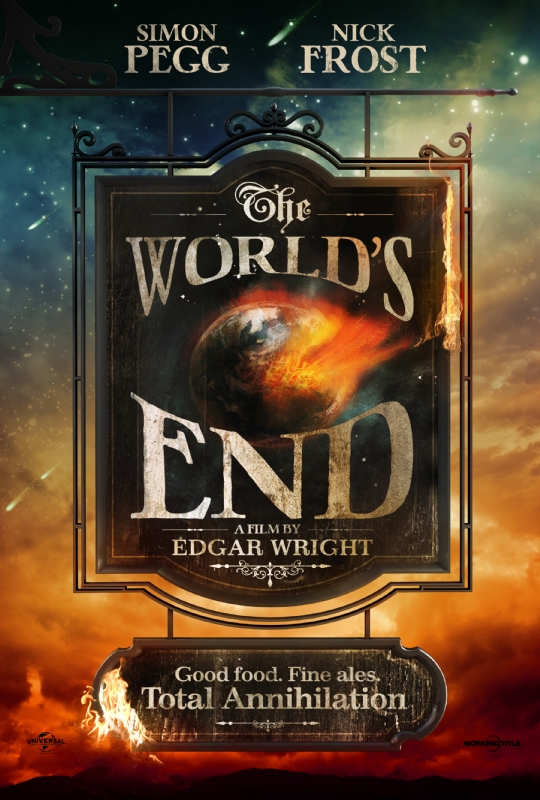The World’s End comes to us as the third and final part of Edgar Wright and Simon Pegg’s Cornetto Trilogy. That branding comes with certain expectations as the first two outings, Shaun of the Dead and Hot Fuzz, are two of the finest examples of modern British cinema around. Shaun of the Dead took on the horror genre, with a twist on classic zombie movies that we’d never seen, Hot Fuzz reimagined Hollywood blockbuster action movies with a British twist, and now The World’s End is going to make you look at alien invasion films in a whole new light…or at least that’s the premise.”
Edgar Wright and Simon Pegg are back on writing duties, with Wright returning behind the camera, and Pegg returning as the lead. Also in place is Nick Frost, Pegg’s erstwhile companion. With the trioka in place we are instantly back in familiar territory but thankfully the guys have decided to shake things up a little… The film opens with a monologue from Pegg’s Gary King, describing with utter reverie, the single greatest night of his life…the night he and his compatriots embarked on the Golden Mile, a pub-crawl of 12 bars, from the legendary First Post to The World’s End, only to fail in glory. Nothing for Gary has gotten better since that night and so he becomes determined to recapture old glories by rounding up the lads and making a fresh attempt at conquering this epic feat of drinking. But something is amiss in the town of Newton Haven…
This film is doused in nostalgia with Gary stuck in the 90’s, driving the same car, wearing the same clothes, and listening to the same music as he did as a teen. Sadly for Gary all of his mates have moved on with their lives and we get to see how as he visits each one in turn to reassemble his gang. First up is Eddie Marsan’s Peter, a car-salesman living in the shadow of his father and coping with an overbearing wife and distant kids. Marsan plays down-trodden really well, and that’s exactly what he is asked to do here. He does get some great comedy moments, but most come out of his character’s cowardice that through any memorable lines. Second on the list is Paddy Considine’s Steven, an architect and measured individual who is attempting to recapture his youth by dating a 26 year-old yoga instructor. Considine is the rock-hard core of the group, allowing the other 4 members to play their parts secure in the knowledge that he’s handling the acting requirement. Nothing here dispels the notion that he is one of the finest acting talents Britain has produced, and his interplay with Rosamund Pike is heartfelt and touching in all the right ways. The next member of the group is Martin Freeman’s Oliver, a real-estate agent who is married to his smart-phone. Freeman plays the straight-laced Oliver well, but seems a bit overshadowed by his compatriots. The last and crucial member of the gang is Nick Frost’s Andy, a teetotaller who has outgrew Gary and his shenanigans. This is a very different role for Frost, who usually plays loveable schlub sidekick to Pegg’s protagonist. Here he is very much his own man and gets to do some proper dramatic acting, which he does with aplomb. Rosamund Pike appears as the token female and object of affection. She’s quite funny but very underwritten in this boys-own adventure.
As we’ve come to expect from the Pegg-Frost-Wright connection the film is littered with in-jokes, playful character beats and nods to pop-culture. This and the soundtrack gives the audience a familiar warm feeling and invest us in the characters journeys through the film. Edgar Wright’s camera is more muted than we’ve seen, with a number of his trademark visual tics noticeable in their absence. On the script front the film works better without the sci-fi element as the journey of self-discovery/bromance is the more interesting aspect of the film. Granted when it does descend into booze-fuelled, alien-alienation anarchy the special effects money is well spent as the action increases. That aspect of the film has an old-school Doctor Who feel to it and one can’t help but wonder if it will be a little lost on our American cousins when this film airs over there. Everything here screams nostalgia, almost overbearingly so, and the soundtrack certainly accents that. The familiarity should be a warm blanket but it’s just not warm enough.
The World’s End is a fun end to the Cornetto trilogy. A nice piece of escapist cinema wrapped in comforting nostalgia. But it could have been so much more…

